CANwizard CN16: Difference between revisions
RSbySCHÄFER (talk | contribs) No edit summary |
RSbySCHÄFER (talk | contribs) No edit summary |
||
| Line 1: | Line 1: | ||
The Aktiv X Control panel CANwizard_CN16 is a visual operator interface which is based on the platform CANwizard of [[Böhnke & Partner GmbH |Böhnke + Partner GmbH]]. This control panel makes it possible to configurate the [[Panel Node CANnode CN16]] of [[SCHAEFER GmbH]] with no special knowledge of the CANopen system.<br /> | |||
The Aktiv X Control Panel CANwizard_CN16 is included in the CANwizard. When the CAN network or several CANnode are scanned by the CANwizard, the CANwizard identify which AktivX- control panel has to be started over the Vector-ID and the Product-Code.<br /> | |||
The AktivX control panel CANwizard_CN16 can identify with the date entry of the object which version the CANnode is. This version of the CANnode is shown after that at the visual operator interface. With the operator interface the hardware- and producer specific parameters can be admitted. | |||
<br /> | <br /> | ||
| Line 12: | Line 12: | ||
[[Image:CANwizard_CN16_HPM_02.jpg|thumb|Dialog of Basic Settings]] | [[Image:CANwizard_CN16_HPM_02.jpg|thumb|Dialog of Basic Settings]] | ||
The operator interface shows the following information: | |||
* | *Hardware name | ||
* | *Hardware version | ||
* | *Software version | ||
* | *Description of the EDS-file | ||
<br /> | <br /> | ||
The operation wizards can: | |||
* | *send configurations | ||
* | *reread the hardware | ||
* | *change default settings | ||
* | *delete configurations | ||
* | *start function tests | ||
* | *print the clip plan (in preparation) | ||
<br /> | <br /> | ||
The configuration results from several inputs: | |||
* | *Clip type | ||
* | *Description of the clip | ||
*(1) | *(1)coding | ||
*(1) | *(1)Line number (address) | ||
(1) | (1)Only for functions which needs more then one wire<br /> | ||
<br /> | <br /> | ||
Every clip has to be configured separately. | |||
At the version CANnode CN16_VPM and CN16_HPM is an option of a standard configuration for illumination modules. This configuration saves time and minimise mistakes at the configuration.<br /> | |||
<br /> | <br /> | ||
Access to manufacturer specific objects is possible via the basic setting dialog. The following parameter can only be filed one-time and irrevocably on the CAN node . | Access to manufacturer specific objects is possible via the basic setting dialog. The following parameter can only be filed one-time and irrevocably on the CAN node . | ||
Revision as of 16:30, 4 March 2008
The Aktiv X Control panel CANwizard_CN16 is a visual operator interface which is based on the platform CANwizard of Böhnke + Partner GmbH. This control panel makes it possible to configurate the Panel Node CANnode CN16 of SCHAEFER GmbH with no special knowledge of the CANopen system.
The Aktiv X Control Panel CANwizard_CN16 is included in the CANwizard. When the CAN network or several CANnode are scanned by the CANwizard, the CANwizard identify which AktivX- control panel has to be started over the Vector-ID and the Product-Code.
The AktivX control panel CANwizard_CN16 can identify with the date entry of the object which version the CANnode is. This version of the CANnode is shown after that at the visual operator interface. With the operator interface the hardware- and producer specific parameters can be admitted.
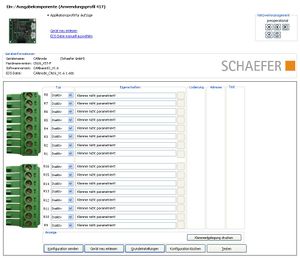
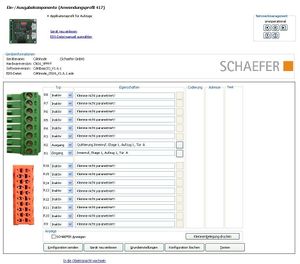
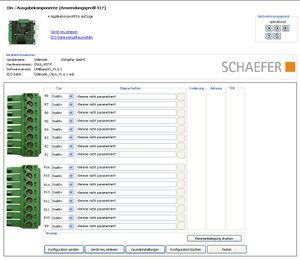
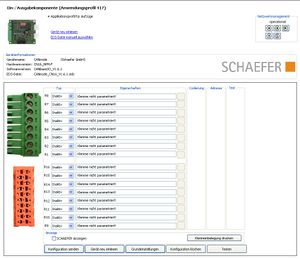
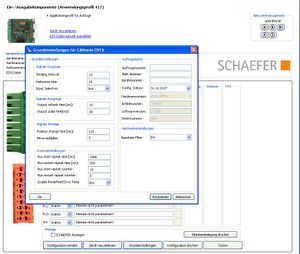
The operator interface shows the following information:
- Hardware name
- Hardware version
- Software version
- Description of the EDS-file
The operation wizards can:
- send configurations
- reread the hardware
- change default settings
- delete configurations
- start function tests
- print the clip plan (in preparation)
The configuration results from several inputs:
- Clip type
- Description of the clip
- (1)coding
- (1)Line number (address)
(1)Only for functions which needs more then one wire
Every clip has to be configured separately.
At the version CANnode CN16_VPM and CN16_HPM is an option of a standard configuration for illumination modules. This configuration saves time and minimise mistakes at the configuration.
Access to manufacturer specific objects is possible via the basic setting dialog. The following parameter can only be filed one-time and irrevocably on the CAN node .
- Ordering data
- Order number
- Sheet number
- Device number
- Configuration date
- Device Identity
- Hardware version
- Article number
- Software version
- Serial number